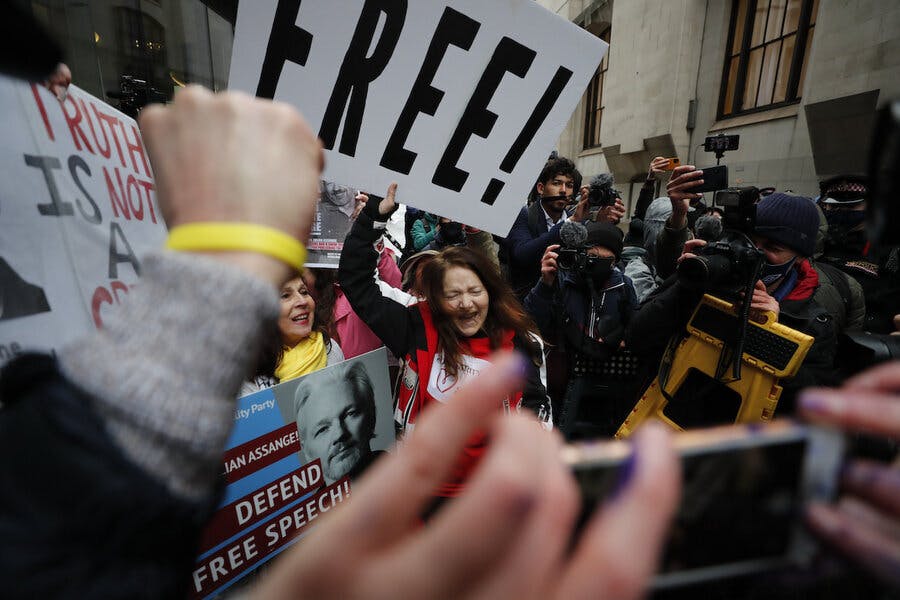Respite for Assange, but UK court sets dangerous precedent

In a stunning turn of events, a British judge has ruled that Julian Assange cannot be extradited to the United States to face charges under that country’ s Espionage Act. The WikiLeaks founder in 2019 was indicted on 17 counts, after a charge relating to computer hacking, made public earlier in the year, first led to the extradition fight.
Speaking at London’s Old Bailey, Judge Vanessa Baraitser discharged Assange, saying that his mental state “is such that it would be oppressive to extradite him to the United States of America”. Close followers of the case were both stunned and relieved—the relentless pursuit made by the US, the appalling conditions under which Assange has been held, and the conduct of the judge during the case all seemed to point to the extradition’s fait accompli.
Indeed, the judge conceded every argument of the prosecution. “As Baraitser intoned her summary judgement, the atmosphere deteriorated. She dismissed the defence case unequivocally, point by point”, writes Tim Dawson, UK National Union of Journalists national executive council member, who was present at the court. “The protection of those accused of political offences implied by the US/UK Extradition Treaty was worthless in this case. Assange is accused of actions that would be offences in the UK, she told the court. His actions could not be compared to those of an investigative journalist and by dumping data he had adversely affected scores of US contacts.
“She declined to consider the uncontested evidence that CIA contacts bugged the Ecuadorian Embassy to snoop on Assange’s meetings with lawyers. And she found ample evidence that a fair trial would be available, once the Wikileaks founder arrived in Virginia ... Baraitser’s cautious delivery continued as she reached her conclusion, providing no prompt of a change in her direction of travel.”
Only at the last minute did she change course to deny the extradition request on health grounds. The decision gives some respite for Assange, but the court has ruled that there is no public interest defence for revealing state secrets. Ultimately, this is what the whole trial is about—not Assange the person, but the act of disclosing war crimes. As Barry Pollack, a lawyer for Assange, told the New York Times when the first indictment was unveiled: “The factual allegations ... boil down to encouraging a source to provide him information and taking efforts to protect the identity of that source”.
The source was Chelsea Manning, who also endured almost seven years in prison before her sentence was commuted in 2017. She was again imprisoned for a year in 2019-20 for refusing to testify against Assange. It was Manning’s heroism that gave the world, through WikiLeaks, the Collateral Murder video, the Iraq war logs and the Afghan war diary, among other things. The subsequent charges amount to a political trial to punish Assange for the United States’ loss of face in the wake of those disclosures.
Reactions to Judge Baraitser’s ruling were swift. The US Department of Justice, which brought the espionage charges, said after the verdict:
“While we are extremely disappointed in the court’s ultimate decision, we are gratified that the United States prevailed on every point of law raised. In particular, the court rejected all of Mr Assange’s arguments regarding political motivation, political offense, fair trial, and freedom of speech. We will continue to seek Mr Assange’s extradition to the United States.”
Amnesty International’s Europe director, Nils Muižnieks, said:
“We welcome the fact that Julian Assange will not be sent to the USA and that the court acknowledged that due to his health concerns, he would be at risk of ill-treatment in the US prison system. But the charges against him should never have been brought in the first place. The charges were politically motivated, and the UK government should never have so willingly assisted the US in its unrelenting pursuit of Assange.”
Michelle Stanistreet, UK National Union of Journalists general secretary, said:
“This decision will be welcomed by all who value journalists’ ability to report on national security issues. However, whilst the outcome is the right one, Judge Vanessa Baraitser’s judgement contains much that is troubling. Her basis for dismissing the US’ extradition request was the suicide risk that Assange poses in a US penal system that would probably have kept him in near total isolation.
“The judge rejected the defence case that the charges against Assange related to actions identical to those undertaken daily by most investigative journalists. In doing so, she leaves open the door for a future US administration to confect a similar indictment against a journalist.”
Jennifer Robinson, a human rights attorney who has advised Assange and WikiLeaks since 2010, said on US news site Democracy Now!:
“This is still very concerning, and free speech groups should still be concerned ... [Baraitshher] agreed with the US prosecution in all other matters, including in respect of the free speech arguments that we had raised about the application of the First Amendment, the unprecedented nature of this case, and the fact that Julian wouldn’t get a fair trial once returned to the United States. So, while we are obviously pleased with the outcome ... for free speech groups, for journalists everywhere, this is not the end of the road. And it sets—I think it shows that this is still a terrible precedent.”
The US Department of Justice has two weeks to appeal the decision. Julian Assange’s legal team will seek bail at Westminster Court on Wednesday.